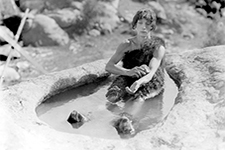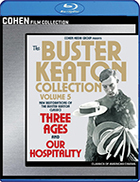Three Ages
|  Having directed 20 popular short films between 1917 and 1923, Buster Keaton could reasonably be said to have mastered the art of the one- and two-reeler by the time he co-produced, co-directed, and starred in his first feature, Three Ages. And, because (like other silent film comedians) he was primarily associated with short films, the fact that Three Ages is essentially three shorts cut together into a feature feels like both a brilliant extension of his previous work and an insurance policy guaranteeing that he didn’t stray too far from what had been working for the previous half decade. Of course, any film that is essentially three separate films is going to risk being uneven, and that is definitely the case with Three Ages, which is enjoyable enough, but hardly in the league of Keaton’s best features like Sherlock Jr. (1924) and The General (1926). The ostensible subject of Three Ages is love, and the film is structed around three narratively and thematically similar stories set during three distinct ages: the prehistoric “Stone Age,” the age of the Roman Empire, and the (then) modern day. In each segment Keaton plays a well-meaning milquetoast who is trying to woo a girl played by Margaret Leahy, a British beauty pageant winner in her only film role (despite having been signed to a three-year contract by producer Joseph M. Schenck). Keaton is then challenged and temporarily bested by a larger, more successful man played by Wallace Beery, a veteran of more than a hundred shorts and features who would go on to win an early Oscar for his dramatic role in The Champ (1931). Keaton has fun with the idiosyncratic details of the different ages: he makes the bearskin clothes and shoes of the Stone Age absurdly furry and awkward (not to mention his fright wig), and his Roman character has a sundial for a wristwatch. There are some amusing connective bits in each story, such as Keaton always having to prove himself against Beery and being found wanting. For example, in the Stone Age, he can’t take a club to the head the way Beery can; in the Roman era, Beery ranks high in the Roman army while Keaton is described as “the rankest”; and in the modern era, his checkbook is a sad, meager thing next to Beery’s (while the latter has his account at First National Bank, Keaton’s is at Last National Bank). So, across the ages Keaton struggles to assert himself, defying the will of Beery’s various villains and the Leahy’s parents (played by Joe Roberts and Lillian Lawrence) who are, of course, convinced that Beery is the better man simply because he is stronger, higher ranking, richer, etc. As with so many of the films of Chaplin and Lloyd, Three Ages is a silent-era revenge-of-the-nerd fantasy, in which meager and meek and decent and kind win out over brute strength and narcissism. Given Keaton’s prodigious comic talents and deep understanding of the camera and how it can be used to enhance, not just record, physical comedy, Three Ages has numerous memorable sequences, the best of which are the absurd chariot race in which Keaton beats Beery by employing sled dogs instead of horses to pull his chariot after it snows and the extended chase sequence that caps the modern sequence, which finds Keaton trying to evade the cops while making it to the church to save Leahy from marrying Beery, who is revealed to be a bigamist and forger. Thus, all the masculine-economic power represented by the towering Beery is ultimately proven to fraudulent, and the only real thing in the world is, the film asserts, true love. It is a nice sentiment and one that we can grab onto, even if the film, which is clearly designed as a subtle parody of D.W. Griffith’s multi-plotted Intolerance (1916), doesn’t fully hold together.
Copyright © 2024 James Kendrick Thoughts? E-mail James Kendrick All images copyright © Cohen Media Group / Kino Lorber | |||||||||||||||||||||||||||||
Overall Rating: 

 (2.5)
(2.5)


